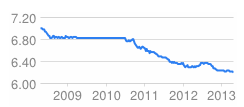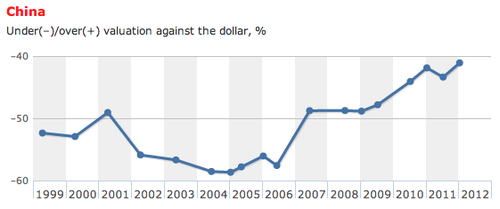Evaluating the valuation of the Chinese renminbi
15 Apr 2013
One of the hot topics in the 2012 presidential election was the valuation of the Chinese renminbi. Both candidates argued that they would pressure China to allow its currency to appreciate since they considered it to be under-valued. This presumably allowed China to expand its exports since its goods were priced artificially low. Romney went as far as saying that he would label China as a currency manipulator, a designation that would legalize the implementation of retaliatory tariffs. However, the data show that the Chinese currency has actually been appreciating over the course of the Obama administration, having risen 11 percent since January 2009 according to the NY Times (the downward shift in the graph below reflects this appreciation).

Another way of looking at this is via The Economist's Big Mac Index. According to that measure, the renminbi has appreciated 40.44% against the dollar. That is, a consumer buying a Big Mac in China had to pay $1.83 as of July 2008, but $2.57 as of January of this year (see below). Of course, Big Macs in the US still costs far more than that, averaging to $. Thus, the Big Mac Index indicates that the renminbi is still under-valued by 41.1%. In other words, while China’s currency has appreciated in a material way since the start of the Obama Administration, it still has a ways to go for the law of one price to finally be achieved.

Still, this non-trivial rise begs the question of why has the currency appreciated as much as it has? Specifically, did political pressure from the US have an impact? Both the House (2010) and the Senate (2011) passed bills calling for administration action in response to the renminbi’s low value. The Senate's recent bill required the administration to impose retaliatory tariffs on China, though the Republican-led House and the Obama White House were reluctant to adopt this hard-line approach for fear of provoking a trade war. Nevertheless, the Obama administration has continued to seek reform and it seems hard to say that these efforts are unrelated to the changes in the currency’s value. Ultimately, determining the precise role of American domestic politics in this rise presents a complicated question, though one deserving of more social scientific attention. As of now, no such work has attempted to do so, though others have been explored this broader topic.
What do you think?



